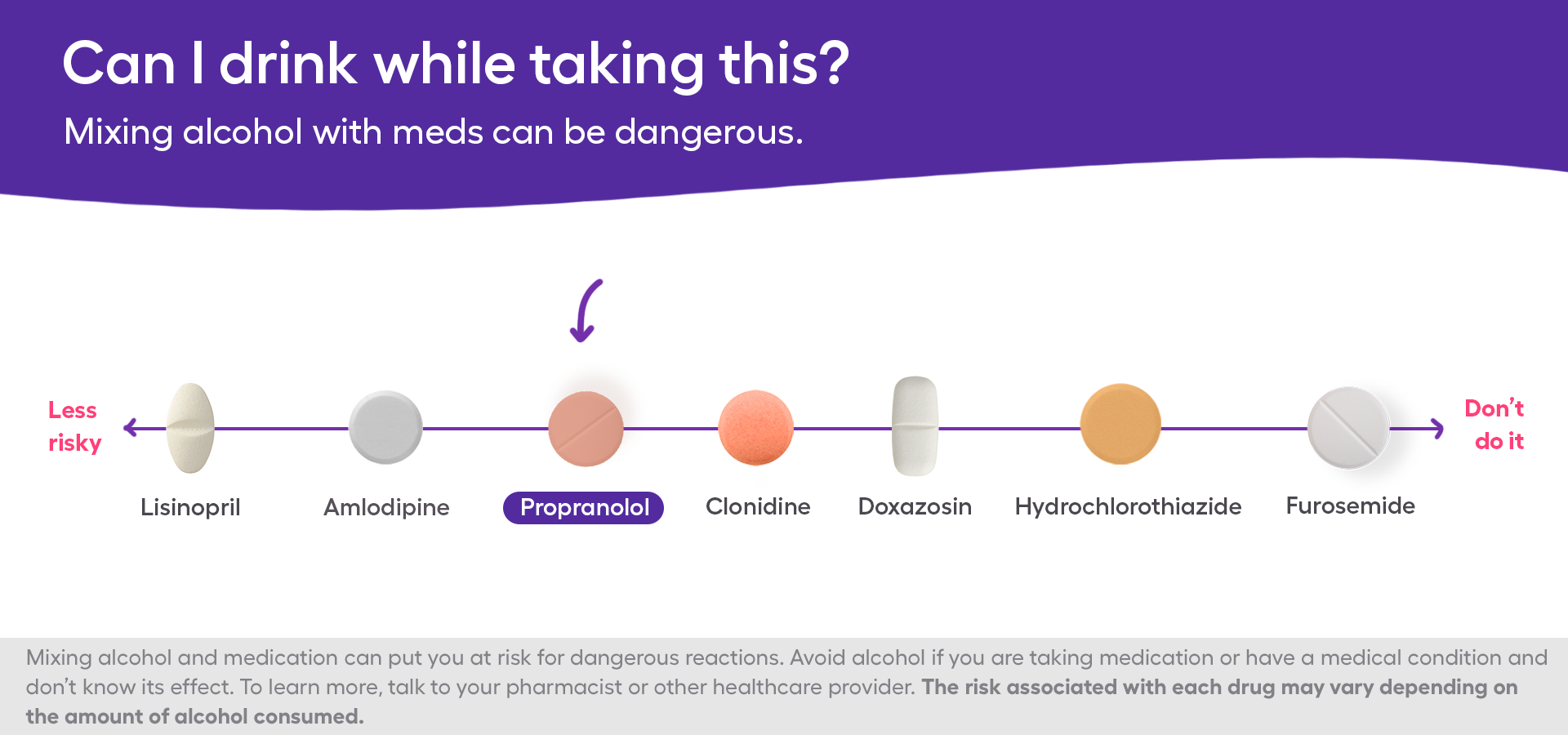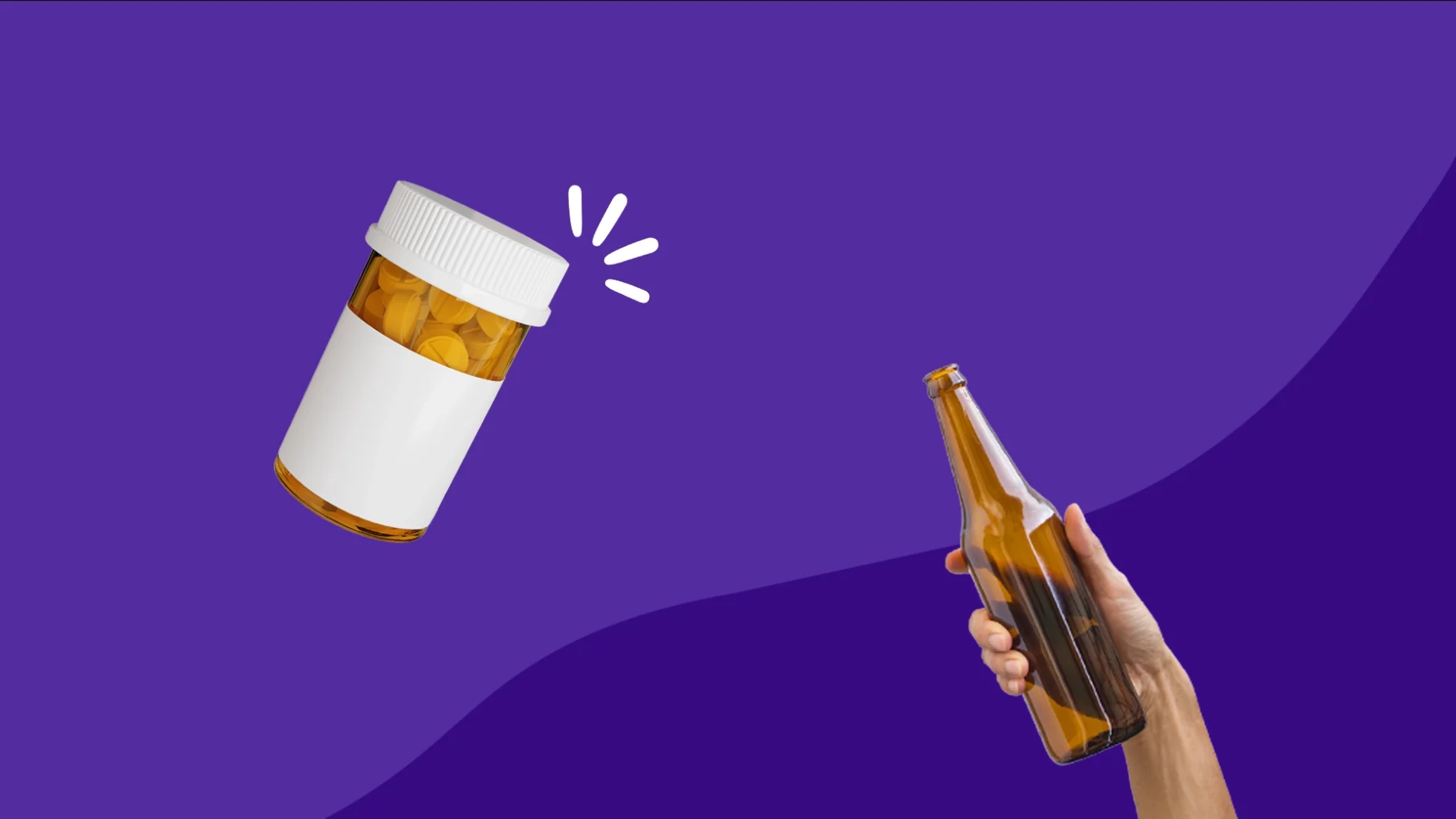Key takeaways
Drinking alcohol while taking propranolol is not recommended, as it can exacerbate side effects like dizziness, lightheadedness, and drowsiness.
People with heart disease and other chronic conditions, older people, and those taking other antihypertensives or drugs for erectile dysfunction are at an increased risk of side effects.
If you’re taking immediate-release propranolol, it may be safe to have a drink eight hours after your dose.
Roughly 120 million people in the United States have high blood pressure, a good portion of whom may be taking propranolol (commonly known by the brand names Inderal LA, Inderal XL, and InnoPran XL) to combat it. “Propranolol is a beta blocker medication. It treats high blood pressure, irregular heartbeats [arrhythmia, caused by conditions like atrial fibrillation], anxiety, migraines, and more,” says internist Supriya Rao, MD. “The medicine slows your heart rate and relaxes blood vessels, which can help reduce the workload on your heart.”
If you’re taking propranolol, one of your first questions is likely whether or not you need to make any changes to your lifestyle, such as avoiding alcohol use. In general, it is not recommended to mix propranolol and alcohol. Read on to find out why, plus what can happen if you do mix them.
Can you drink while taking propranolol?
“It is not recommended to drink alcohol while taking propranolol,” says Mary Greene, MD, a cardiologist at Manhattan Cardiology in New York. “Mixing alcohol with propranolol may exacerbate the blood pressure-lowering effects of propranolol and cause dizziness, lightheadedness, or syncope [fainting].” While alcohol technically neither interferes with the medication’s ability to do its job nor with how it is broken down and utilized in the body, it can cause side effects that ultimately work against the reason you are taking propranolol in the first place.

What happens if you mix propranolol and alcohol?
The first thing that can happen if you mix propranolol and alcohol is that it can exacerbate some of the most common side effects of the blood pressure medication. “Alcohol can amplify its sedative effect, so combining the two can cause dizziness, fatigue, and a drop in your blood pressure,” says Dr. Rao.
While alcohol consumption does not directly lessen the efficacy of propranolol, it can interfere with how your body processes your dose. “Alcohol may cause the levels of propranolol to increase in the blood as if you were taking a higher dose than prescribed, so the medication’s effects [and side effects] may be more pronounced,” Dr. Greene explains.
What’s more, if you’re taking propranolol to control heart conditions and prevent cardiovascular events like heart attack and stroke, you should consider the effects of alcohol intake itself on your heart health. Drinking too often or too much can cause physical symptoms like increased heart rate and blood pressure, angina (chest pain), or an irregular heartbeat, all of which conflict with the reason you would be taking propranolol in the first place.
Are certain people at greater risk of side effects?
There are some groups of people who are at a greater risk of experiencing side effects from mixing alcohol and propranolol. Here are the biggest ones to be aware of.
People with certain health conditions
Dr. Rao notes that people with low blood pressure, heart failure, liver disease, and diabetes (high blood sugar) are at a higher risk of side effects. These conditions impair all the systems that are responsible for breaking down propranolol and alcohol, which means both substances could take longer to move through your system. The result is an increased risk of side effects.
Older people
Older people are also at a higher risk of side effects. “Older adults are more susceptible because their bodies process medications and alcohol differently,” Dr. Rao says. According to the American Geriatrics Society, older people’s bodies break down medications more slowly. This means those medicines stay in their systems for longer, putting them at an increased risk of side effects that may have more severe consequences for older folks than younger, such as dizziness that leads to a fall.
People taking other medications
If you have other prescription medications that you are taking regularly, you may also have a higher risk of side effects. “If someone was already on other blood pressure-lowering medication in addition to taking propranolol, alcohol should definitely be avoided,” says Dr. Greene. Alcohol will exacerbate the effects of both medications.
“Take caution if you’re taking erectile dysfunction drugs as well,” Dr. Greene adds. Both alcohol and erectile dysfunction drugs (like sildenafil and tadalafil) can cause a drop in blood pressure. When they are combined with medication that’s meant to lower blood pressure, like propranolol, it becomes much more likely that you will experience symptoms or side effects of low blood pressure, like dizziness, lightheadedness, fainting, or weakness.
How long after taking propranolol can you drink alcohol?
If you’ve just started taking propranolol for hypertension or an irregular heartbeat, Dr. Rao recommends avoiding alcohol altogether while you’re getting used to the medication or adjusting your dose. That way, you’ll have a clearer picture of how your body is reacting to the drug and how it’s working for you.
Once you’ve been taking the medication for a while, it may be okay to have a drink a certain amount of time after your dosage. How long you have to wait depends on the formulation you take.
- Immediate-release: “Immediate-release propranolol is typically metabolized in the body within 6-12 hours (8 on average) with a peak plasma time of 1-4 hours,” Dr. Greene says. Having a drink eight hours after your dose will minimize alcohol’s effects. If you take a dose more than once a day, seek medical advice from your healthcare provider about whether it’s safe for you to have a drink between pills.
- Extended-release: This form of propranolol is typically metabolized within 24-27 hours, with peak plasma time in 6-14 hours, says Dr. Green. It’s recommended to take extended-release propranolol at bedtime, so if you were to have a drink in the late afternoon or evening, your chances of experiencing increased side effects are slim.
Which antihypertensives are not affected by alcohol?
Alcohol is generally not recommended if you are taking any type of antihypertensive medication. That said, there are different types of medication for high blood pressure and its associated conditions. Propranolol belongs to a class of heart medicines known as beta blockers. Other beta blockers include acebutolol, atenolol, bisoprolol, metoprolol, nadolol, and nebivolol. These prescriptions work by blocking the effects of the hormone epinephrine, and you should do your best to avoid alcohol when taking them.
“Some antihypertensives, like ACE inhibitors or calcium channel blockers, may have fewer interactions with alcohol compared to beta blockers,” Dr. Rao says. Propranolol alternatives for high blood pressure include:
| Propranolol alternatives | ||
|---|---|---|
| ACE inhibitors | Benazepril | Coupons |
| Captopril | Coupons | |
| Enalapril | Coupons | |
| Fosinopril | Coupons | |
| Lisinopril | Coupons | |
| Moexipril | Coupons | |
| Perindopril | Coupons | |
| Quinapril | Coupons | |
| Ramipril | Coupons | |
| Trandolapril | Coupons | |
| Calcium channel blockers | Amlodipine | Coupons |
| Diltiazem | Coupons | |
| Felodipine | Coupons | |
| Isradipine | Coupons | |
| Nicardipine | Coupons | |
| Nifedipine | Coupons | |
| Nisoldipine | Coupons | |
| Verapamil | Coupons |
According to the Mayo Clinic, beta blockers are typically only prescribed if another medication, such as an ACE inhibitor or calcium channel blocker, is not working to lower blood pressure. So if you enjoy drinking and one of these alternative treatment options is working for you, it’s probably best to stay on it as long as you can.
The bottom line
Especially when you first start taking the prescription, you should avoid drinking alcohol as it can worsen the potential side effects of propranolol, such as dizziness, lightheadedness, and fatigue. People with certain chronic health conditions, older people, and those taking other antihypertensives or drugs for erectile dysfunction are at an increased risk. Once you’ve adjusted to the medication, it may be safe to drink eight hours after your dose, with guidance from a healthcare professional.
- Propranolol (Cardiovascular), National Library of Medicine (2023)
- How alcohol affects your heart, Cleveland Clinic (2022)
- Medications work differently in older adults, AGS Health in Aging Foundation (2023)
- Do erectile dysfunction (ED) drugs interact with alcohol?, Drugs.com (2024)
- Low blood pressure, National Heart, Lung, and Blood Institute (2022)
- Beta blockers, Mayo Clinic (2025)
- Angiotensin-converting enzyme (ACE) inhibitors, Mayo Clinic (2025)
- Calcium channel blockers, Mayo Clinic (2025)




